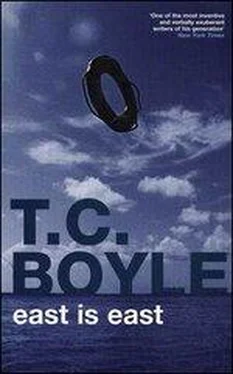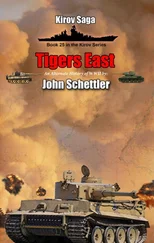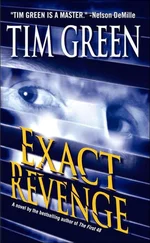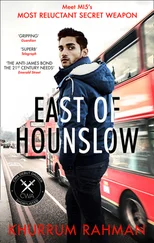Tom Boyle - East is East
Здесь есть возможность читать онлайн «Tom Boyle - East is East» весь текст электронной книги совершенно бесплатно (целиком полную версию без сокращений). В некоторых случаях можно слушать аудио, скачать через торрент в формате fb2 и присутствует краткое содержание. Жанр: Современная проза, на английском языке. Описание произведения, (предисловие) а так же отзывы посетителей доступны на портале библиотеки ЛибКат.
- Название:East is East
- Автор:
- Жанр:
- Год:неизвестен
- ISBN:нет данных
- Рейтинг книги:5 / 5. Голосов: 1
-
Избранное:Добавить в избранное
- Отзывы:
-
Ваша оценка:
- 100
- 1
- 2
- 3
- 4
- 5
East is East: краткое содержание, описание и аннотация
Предлагаем к чтению аннотацию, описание, краткое содержание или предисловие (зависит от того, что написал сам автор книги «East is East»). Если вы не нашли необходимую информацию о книге — напишите в комментариях, мы постараемся отыскать её.
, praised by
in
as "one of the most exciting young fiction writers in America," the result is a sexy, hilarious tragicomedy of thwarted expectations and mistaken identity, love, jealousy, and betrayal.
East is East — читать онлайн бесплатно полную книгу (весь текст) целиком
Ниже представлен текст книги, разбитый по страницам. Система сохранения места последней прочитанной страницы, позволяет с удобством читать онлайн бесплатно книгу «East is East», без необходимости каждый раз заново искать на чём Вы остановились. Поставьте закладку, и сможете в любой момент перейти на страницу, на которой закончили чтение.
Интервал:
Закладка:
Too shy to go in, Hiro only gaped at the window that first day, fascinated, wondering if the photo was real—there was blood, after all, perfect black streaks of blood dribbling from the wounds like grisly brushstrokes. But then, maybe they were too perfect, maybe the whole thing had been staged—a still from a movie or a play—maybe they were brushstrokes. And where would anyone come by such a picture if it was real? People weren’t tortured to death these days, were they? And with arrows? He wondered if the man might not be an explorer, captured and executed by some big-lipped tribe in New Guinea or South America. If he was, and there was a book about it, Hiro wanted it.
The next day, he steeled himself and went into the shop. It was a cramped and dark place, row upon row of books on metal shelves affixed to the walls, a smell of newsprint and mold and a fruity false air freshener. Fifteen or twenty customers browsed through the stacks of foreign newspapers or waddled up and down the aisles, arms laden with books. Aside from the rustle of lovingly turned pages, the place was as quiet as a shrine. Hiro approached the desk, where a big-shouldered man in smoked glasses with western-style frames sat behind a cash register. Hiro cleared his throat. The man, who’d been staring out the window at nothing, gave him an indifferent glance.
“The poster in the window, sir,” Hiro said, so softly he could barely hear himself, “is that a book? I mean, is there a book about it?”
The man looked at him a moment, as if deciding something. Finally, in a weary voice, he said: “That’s Mishima.”
It was luck, it was fate, it was magic. Hiro stood bewildered before the rack the shop owner pointed him to—twenty, twenty-five, thirty Mishima titles in duplicate and triplicate and more taking a good slice out of the wall. It was as if his hand was guided: the first book he chose, the very first, was The Way of the Samurai. He slipped it off the shelf, pleased by its glossy cover and the drawing of dueling swordsmen that seemed to dance across it. He never even glanced inside: the cover was enough. That and the poster. He laid down his money for the laconic shopkeeper and ducked out the door with his treasure, one eye on the cruel photo of the martyred author.
Like most Japanese boys, Hiro knew the mythos of the samurai as thoroughly as his American counterpart knew that of the gun-slinger, the dance-hall girl and the cattle rustler. The wandering samurai, like the lone man on the horse, was a mainstay of network TV, the movie theater, cheap adventure novels and lurid comics, not to mention classics like The Forty-Seven Ronin that were on every school reading list. But after a period when he was eight or nine and ran around all day with a wooden sword and a hachimaki looped round his head, he’d outgrown his fascination with the whole business of topknots and swords: samurai, he could take them or leave them. Still, when he opened Mishima’s book, it brought him back. He didn’t know then of Mishima’s right-wing politics, of his homosexuality and grandstanding, or even of his ritual suicide—all he knew was that he’d entered another world.
The book puzzled him at first. It wasn’t a story. There were no swordfights, no hair-raising tales of samurai derring-do and acts of redemptive heroism. No. It was a study, a commentary actually, by this man, this Mishima with the arrows in his groin, on Jōchō Yamamoto’s ancient samurai code of ethics, Hagakure. Hiro didn’t know what to make of it. I discovered that the Way of the Samurai is death, he read. And: Human beings in this life are like marionettes … free will is an illusion. He read that it was acceptable for a samurai to apply rouge if he woke up with a hangover and that wetting the earlobes with spittle would control nervousness in any situation. It all felt faintly ridiculous.
But he stuck with it, though it was like a textbook, a manual, like something he might read in a science or navigation class. He kept seeing the picture of the martyred author—only later did he realize it was a pose, Mishima’s masochistic homage to an Italian painting of a martyred saint—and he plowed through the book as if it were written in code, as if it were his personal initiation into the arcane rites and ancient secrets that would make their master the equal of anyone. It was a game, a puzzle, a conundrum. Hagakure —Hidden Among the Leaves—even its title was mysterious. In the following weeks he went back to the shop several times—the poster was gone, replaced by a life-size cutout of an old man with the face of a bird and a shock of white hair—to sample Mishima’s other books. They were novels, for the most part, and he enjoyed them, but none of them had the tug of the first. There was something there, and he didn’t know what it was. Over and over he read the cryptic passages, over and over. And then one day, in the way that the sun suddenly breaks through the clouds in the midst of a storm, he had it.
They’d ganged up on him at the ballfield—six or seven of them—and they’d slapped him around and flung his Yomiuri Giants cap into the sewer. He was in a rage, but the rage gave way to despair. When would it end, he asked himself, and the answer was never. He barely spoke to his grandparents that night, and he was restless: he didn’t want to watch the game shows, didn’t want to listen to tapes on his Walkman, he didn’t want to study or read. Finally, out of boredom, he picked up his dog-eared copy of Hagakure, opened it at random and began to read. The passage was about modern society, about how corrupt and weak it had become, and all at once, as if a switch had been flipped inside his head, Mishima’s words made perfect sense. All at once he understood: the book was about glory, and nothing less.
The society around him—the society into which he’d tried to fit himself all the years of his life—was corrupt, emasculated, obsessed with material things, with the pettiness of getting and taking, selling and buying—and where was the glory in that? Where was the glory in being a nation of salarymen in white shirts and western suits making VCRs for the rest of the world like a tribe of trained monkeys? Hiro saw it, saw it clearly: Fujima, Morita, Kawakami and all the rest of them, they were nothing, eunuchs, wimps, gutless and shameless, and they would grow up to chase after yen and dollars like all the other fools who made fun of him, who singled him out as the pariah. But he wasn’t the pariah, they were. To live by the code of Hagakure made him more Japanese than they, made him purer, better. It was the ultimate code of fea purē —or no, it went beyond fea purē and into another realm altogether, a realm of power and confidence—of purity—that transcended the material, the flesh, death itself. He’d been made to feel inferior all his life, and here was a way to conquer it—not only on the ballfield, but on the streets and in the restaurants and theaters and anywhere else he chose to go. He would fight back at Fujima and the rest of them with the oldest weapon in the Japanese arsenal. He would become a modern samurai.
But now, as he lay on the Amerikajiris cramped little couch, using Jōchō as his pillow, all that seemed an eternity away. To rely on Jōchō had become automatic with him, but now he was in America, where everyone was a gaijin and no one cared, and he would have to find a new code, a new way to live. His tormentors were back in Yokohama and in Tokyo, they were sailing for New York aboard the Tokachi-maru, and he was free—or he would be, if only he could get to Beantown or the City of Brotherly Love. The thought soothed him—he envisioned a city like Tokyo, with skyscrapers and elevated trains and a raucous snarl of traffic, but every face was different—they were white and black and yellow and everything in between—and they all glowed with the rapture of brotherly love. He held that image as he might have sucked a piece of candy. And then he shut his eyes and let the night fall in on him.
Читать дальшеИнтервал:
Закладка:
Похожие книги на «East is East»
Представляем Вашему вниманию похожие книги на «East is East» списком для выбора. Мы отобрали схожую по названию и смыслу литературу в надежде предоставить читателям больше вариантов отыскать новые, интересные, ещё непрочитанные произведения.
Обсуждение, отзывы о книге «East is East» и просто собственные мнения читателей. Оставьте ваши комментарии, напишите, что Вы думаете о произведении, его смысле или главных героях. Укажите что конкретно понравилось, а что нет, и почему Вы так считаете.











